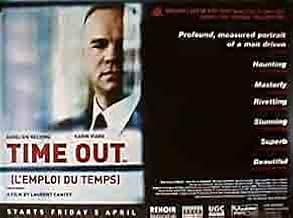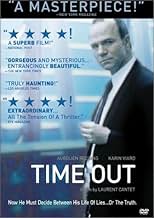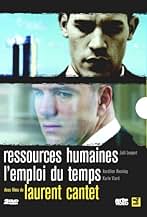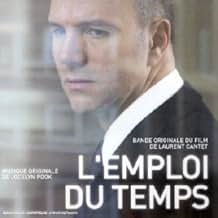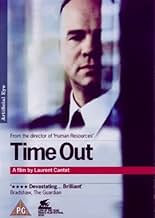L'emploi du temps
- 2001
- Tous publics
- 2h 14min
NOTE IMDb
7,3/10
5,1 k
MA NOTE
Un chômeur voit sa vie s'envenimer de plus en plus alors qu'il cache sa situation à sa famille et à ses amis.Un chômeur voit sa vie s'envenimer de plus en plus alors qu'il cache sa situation à sa famille et à ses amis.Un chômeur voit sa vie s'envenimer de plus en plus alors qu'il cache sa situation à sa famille et à ses amis.
- Récompenses
- 3 victoires et 8 nominations au total
Histoire
Le saviez-vous
- AnecdotesInspired by a true story, that of Jean-Claude Romand. In reality, Romand went on to kill, on January 9, 1993, his wife, two children and both his parents. It is the first of three films in two years inspired by the case, followed by L'adversaire (2002) and La vida de nadie (2002), of which the former is the closest to the real events. Phantom (2002) was also inspired by the same incident.
- ConnexionsFeatured in The 2003 IFP Independent Spirit Awards (2003)
- Bandes originalesL'Emploi Du Temps - Musique Originale
Composed by/ Arranged By Jocelyn Pook
Performed by 'Electra Strings' Ensemble
Cello Solo performed by Sophie Harris
Viola Solo performed by Clive Howard
Violin solo performed by Jacqueline Norrie
Phonographic Copyright (p) Jocelyn Pook / Haut et Court
Under Exclusive License To Virgin France
Published By Chester Music Ltd.
© 2001 Virgin France
Commentaire à la une
Playing authority figures in dark suits, the actor Stellan Skarsgard always suggests a noble melancholy, a weatherbeaten soul underneath his Swedish-oil-exec good looks. William H. Macy has made a career out of essaying the disappointments of pride-in-professionalism white men. Aurelien Recoing, the hero of Laurent Cantet's L'EMPLOI DU TEMPS, doesn't summon the instant empathy we feel for those actors. Cantet is a schematist in the style of Arthur Miller: without Miller's cornballs, but also without his visceral punch. Recoing's very body seems to be a manifestation of Cantet's two-sided patness. From the front, Recoing has some of the bland, boyish-haired handsomeness of a Skarsgard or a young Klaus Maria Brandauer. From the back, balding and bearlike-hulking, Recoing is a monster or a wreck. Cantet's movies--old-school, slowly downhill-rolling tragedies about the inhumanity of late capitalism--use Jekyll-and-Hyde dichotomies for thudding dramatic effects.
Recoing's Vincent has lost his job as a management consultant. Instead of getting another one, he drives around, hangs out in office-building lobbies and hotel bars, and generally dresses and comports like an upper-middle-class Frenchman. When he starts dreaming up a fantasy job--bringing bucks to developing markets in the Third World via the U.N.--he starts taking money from all-too-eager friends to invest. Then a middle-class mobster is onto Vincent's scheme. And from there...before you can say FARGO, the cards come tumblin' down.
Like Cantet's last movie, HUMAN RESOURCES, we are meant to hate the game, not the player, and to believe that a rigged, soulless system has robbed Cantet's characters of their capacity to experience joy on earth. But what does this character want, exactly? At one moment, he seems to genuinely wish he had the idealistic U.N. job--something, at his stage of life, with his background in the for-profit world, he could never attain. At other moments he seems to want to drive around the snowy countryside and listen to golden oldies. At still others, he seems to enjoy, a la Kevin Spacey in AMERICAN BEAUTY, the undemanding work of selling hot stereos and toasters for his mafia friend. And yet Cantet has designed the movie to make it seem as if the need for status, for patriarchal prestige, has led Vincent into the fantasy land that is his undoing. The ending--a softer landing than you might be expecting--is meant to be soul-chilling.
But what's the big whip? Everyone has dreamed of a life of aimless rambling; those who have it never seem very happy with it. (Cantet could've tested his ideas if he had bought Vincent a ticket to a lazybones' paradise.) And Cantet underlines the irony that Vincent's hustling to keep himself in non-work is in itself a more than full-time job. Cantet's movies struggle for a Miller-like inevitability, but they always fail to persuade on a human level; his crushed heroes seem more constructs than creatures. One brilliantly observant (and shudder-inducingly cruel) moment: Vincent's wife catches on to his ruse when he brings a buddy from the office to dinner--a pockmarked hustler who is too low-class to inhabit the highflown world Vincent pretends to have a berth in. The jig is up for Vincent because his wife's snob meter goes off. Too bad nothing else is as acutely examined or observant.
Recoing's Vincent has lost his job as a management consultant. Instead of getting another one, he drives around, hangs out in office-building lobbies and hotel bars, and generally dresses and comports like an upper-middle-class Frenchman. When he starts dreaming up a fantasy job--bringing bucks to developing markets in the Third World via the U.N.--he starts taking money from all-too-eager friends to invest. Then a middle-class mobster is onto Vincent's scheme. And from there...before you can say FARGO, the cards come tumblin' down.
Like Cantet's last movie, HUMAN RESOURCES, we are meant to hate the game, not the player, and to believe that a rigged, soulless system has robbed Cantet's characters of their capacity to experience joy on earth. But what does this character want, exactly? At one moment, he seems to genuinely wish he had the idealistic U.N. job--something, at his stage of life, with his background in the for-profit world, he could never attain. At other moments he seems to want to drive around the snowy countryside and listen to golden oldies. At still others, he seems to enjoy, a la Kevin Spacey in AMERICAN BEAUTY, the undemanding work of selling hot stereos and toasters for his mafia friend. And yet Cantet has designed the movie to make it seem as if the need for status, for patriarchal prestige, has led Vincent into the fantasy land that is his undoing. The ending--a softer landing than you might be expecting--is meant to be soul-chilling.
But what's the big whip? Everyone has dreamed of a life of aimless rambling; those who have it never seem very happy with it. (Cantet could've tested his ideas if he had bought Vincent a ticket to a lazybones' paradise.) And Cantet underlines the irony that Vincent's hustling to keep himself in non-work is in itself a more than full-time job. Cantet's movies struggle for a Miller-like inevitability, but they always fail to persuade on a human level; his crushed heroes seem more constructs than creatures. One brilliantly observant (and shudder-inducingly cruel) moment: Vincent's wife catches on to his ruse when he brings a buddy from the office to dinner--a pockmarked hustler who is too low-class to inhabit the highflown world Vincent pretends to have a berth in. The jig is up for Vincent because his wife's snob meter goes off. Too bad nothing else is as acutely examined or observant.
Meilleurs choix
Connectez-vous pour évaluer et suivre la liste de favoris afin de recevoir des recommandations personnalisées
- How long is Time Out?Alimenté par Alexa
Détails
Box-office
- Montant brut aux États-Unis et au Canada
- 448 542 $US
- Montant brut mondial
- 1 213 913 $US
- Durée2 heures 14 minutes
- Couleur
- Mixage
- Rapport de forme
- 1.85 : 1
Contribuer à cette page
Suggérer une modification ou ajouter du contenu manquant

Lacune principale
By what name was L'emploi du temps (2001) officially released in India in English?
Répondre



